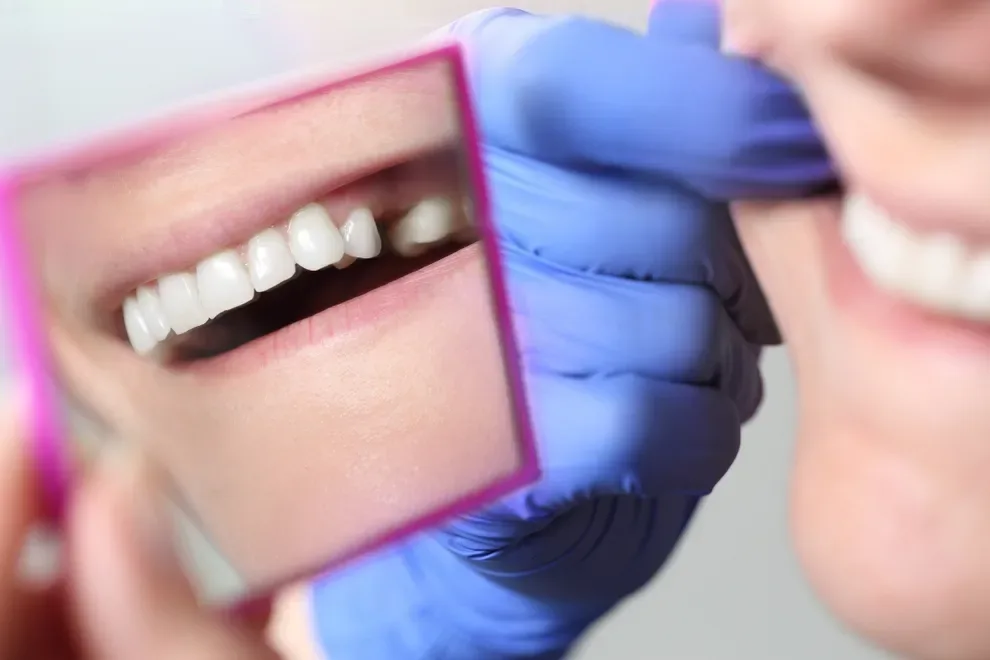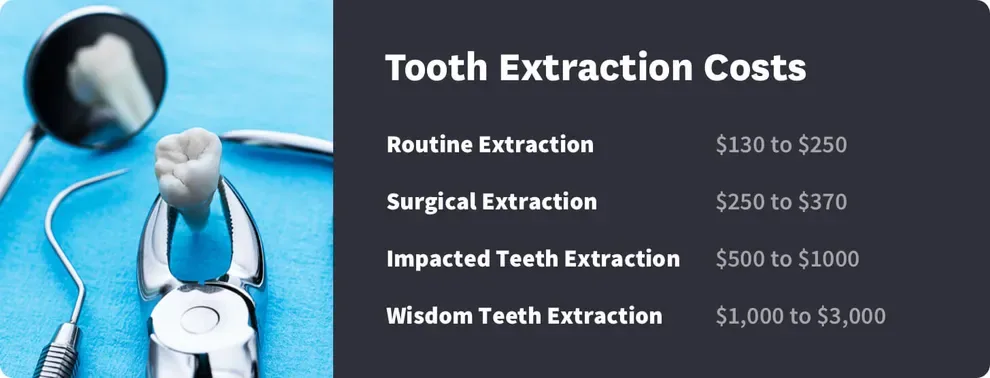Tooth Extraction Costs: With & Without Insurance

Table of Contents
- Key Facts
- Reasons for Tooth Extraction
- Cost Breakdown
- Factors that Impact the Cost
- Costs for Extractions
- Additional Fees & Procedures
- Tooth Extraction Cost without Insurance
- Insurance Coverage for Tooth Extractions
- Preventing Tooth Decay
- Insurance Coverage for Tooth Extractions FAQs
- References
The costs of tooth extraction vary based on whether you have dental insurance and if the extraction is deemed medically necessary.
On average, the cost of a tooth extraction can range from $130 to $250 for a basic extraction. Extracting impacted teeth costs more.
The most expensive type of tooth extraction is removing wisdom teeth. The costs for wisdom teeth extraction may average around $1,000-$3,000 per tooth.

Key Facts about the Cost of a Tooth Extraction
A tooth may need to be extracted due to extreme decay, weak structure due to bone loss, or a fracture or break. Impacted teeth, including wisdom teeth, may also need to be extracted.
Without insurance, a simple extraction may cost around $300 per tooth. An extraction of a compacted or wisdom tooth may cost $1,000 to $3,000.
In addition to the type of extraction, other factors can increase the price, including your location, the rates charged by your dentist, the location of the extraction in your mouth, and if there are any additional complications.
Additional in-office procedures, like x-rays and anesthesia, may add considerably to the cost of tooth extraction.
If you have a dental insurance policy, approximately 70% to 80% of your costs may be covered. Talk to your provider to clarify your coverage.
Reasons for Tooth Extraction
Many adults in the United States have had their wisdom teeth removed, which is a type of tooth extraction. At some point in your life, you may need to have another tooth or two removed due to injury or disease.
Unlike having your wisdom teeth removed, having one tooth extracted usually only requires local numbing agents. Your dentist will give you some aftercare recommendations, including prescriptions to ease pain and prevent infection. You will then discuss the next steps, like getting a dental implant to replace the extracted tooth.
Understanding the Cost Breakdown of a Tooth Extraction
There are several reasons you may need to have a tooth removed. Here are a few:
The tooth is impacted or never ruptured, especially if it is an impacted wisdom tooth.
You have bone loss around the tooth, which makes it unstable.
Your tooth is fractured or broken.
You have irreparable tooth decay and cavities.
Tooth extractions are covered by dental insurance when they are medically necessary, but even with dental insurance you can still expect to pay something out of pocket.
Factors that Impact the Cost of a Tooth Extraction
Having a tooth extracted seems like a simple enough procedure, but there are some factors that impact the overall cost. These may include the following:
The cost of living in your city: The cost of dental services, including tooth extractions, may be more expensive in some geographical regions or major cities.
Your dentist’s experience and skill level: Some specialists may charge more for additional expertise or experience.
The type of extraction: Surgical extractions and the extraction of impacted teeth (including wisdom teeth) will be more expensive.
The location in the mouth: Back teeth may be harder to reach and work on. These may require a specialist or additional billable time.
Any complications. Complications like infections, gum problems, or surrounding decay may make the procedure more difficult and increase in-office time or require the help of a specialist.
Tooth extractions are covered by dental insurance when they are medically necessary, but even with dental insurance, you can still expect to pay something out of pocket.
Costs for Different Types of Extractions
Costs for tooth extractions will depend on the type of extraction needed.
A simple, routine extraction can cost anywhere from $130 to $250 per tooth.
A surgical extraction will cost more since it requires removing some gum and bone along with the tooth. This can cost as much as $250 to $370 per tooth.
Impacted teeth, including wisdom teeth, will cost more because the operation is more complicated. You could spend up to $500 per tooth if they are impacted.
Pulling wisdom teeth is one of the more complicated and expensive forms of tooth extraction. Overall costs range from $1,000 to $3,000, depending on how complicated it is to remove the teeth. When wisdom teeth are starting to come in or have mostly come in, they are easier to remove than impacted teeth that have not erupted yet.
Additional Fees & Procedures for Tooth Extractions
Local numbing agents are often enough for simple extractions. If you have serious issues around your tooth or if you are getting your wisdom teeth removed, your dentist may recommend more sedation, including general anesthesia. This is often a separate cost and requires an anesthesiologist as part of the surgical team.
The x-rays that are taken before and after your tooth extraction can get lumped into your bill too. While your dental insurance will cover annual x-rays as part of preventative treatment, additional x-rays are not likely to be covered.
A panoramic x-ray can cost as much as $120; however, one basic x-ray is about $30. The exam fee might be $75.
How Much Does a Tooth Extraction Cost without Insurance?
Simple tooth extractions may average around $300 without insurance, but additional fees like anesthesia and x-rays can add hundreds of dollars to the bill.
Complex tooth extraction, including pulling wisdom teeth, may cost more than $1,000 to $3,000 without insurance.
Insurance Coverage for Tooth Extractions
Typically, dental insurance will cover some of the cost of routine dental extractions, often as much as 70% to 80% of the upfront cost. However, you may still pay something out of pocket.
Discuss all the costs with your dentist beforehand, so you understand what to expect. Ask about how to ensure dental insurance covers as much as possible, how you can set up reasonable payments for the rest of your needed care, and if there are steps you can take to lower the overall cost.
You may need a dental implant or bridge to replace the missing tooth. If you have wisdom teeth pulled, these are not replaced by implants. If you have another permanent tooth removed, your dentist may want to replace it with an implant to keep your bite aligned properly. This will come at an additional cost.
Before you can get an implant, you’ll need time for your gums and jaw to heal after the extraction. This time can help you plan for the cost of the implant and learn more about what the best crown material would be for you.
Preventing Tooth Decay & the Need for Further Extractions
Sometimes, you break or damage a tooth and it must be extracted, and this has nothing to do with preventative steps you could have taken. It is important to have a good relationship with a general dentist whom you can turn to in situations like this.
In general, you should practice good oral hygiene to keep your teeth healthy. This includes brushing twice a day and flossing. This can keep food particles from leading to plaque buildup and tooth decay.
If you need a tooth extracted, talk to your dentist about your overall alignment. If you have crooked or gapped teeth, or other alignment issues, this might be an important consideration. An implant won’t move like natural teeth will, so it's worth determining your alignment treatment plan before having the implant put in.
Straighter teeth improve your self-confidence, but they also help you keep your teeth cleaner. An aligned smile means there are fewer places for food particles to hide. This means less plaque buildup, which leads to tooth decay over time.
When your overall oral health is better, you can avoid issues that lead to tooth extractions.
Frequently Asked Questions about Insurance Coverage for Tooth Extraction
On average, you’ll pay $130 to $250 for a tooth extraction without insurance.
With insurance, you can expect to pay $50 to $125 for a tooth extraction, depending on the specifics of your dental plan.
Since tooth extractions are considered medically necessary, they are almost always covered by dental insurance. Different plans cover extractions at different levels, but you can expect to pay something out of pocket, even if you have dental insurance.
If you qualify for government-based health insurance, such as Medicare or Medicaid, tooth extractions are generally covered if deemed medically necessary.
Some dental schools may offer discounted fees for procedures like extractions. Students will often perform the extraction under the supervision of an instructor.
